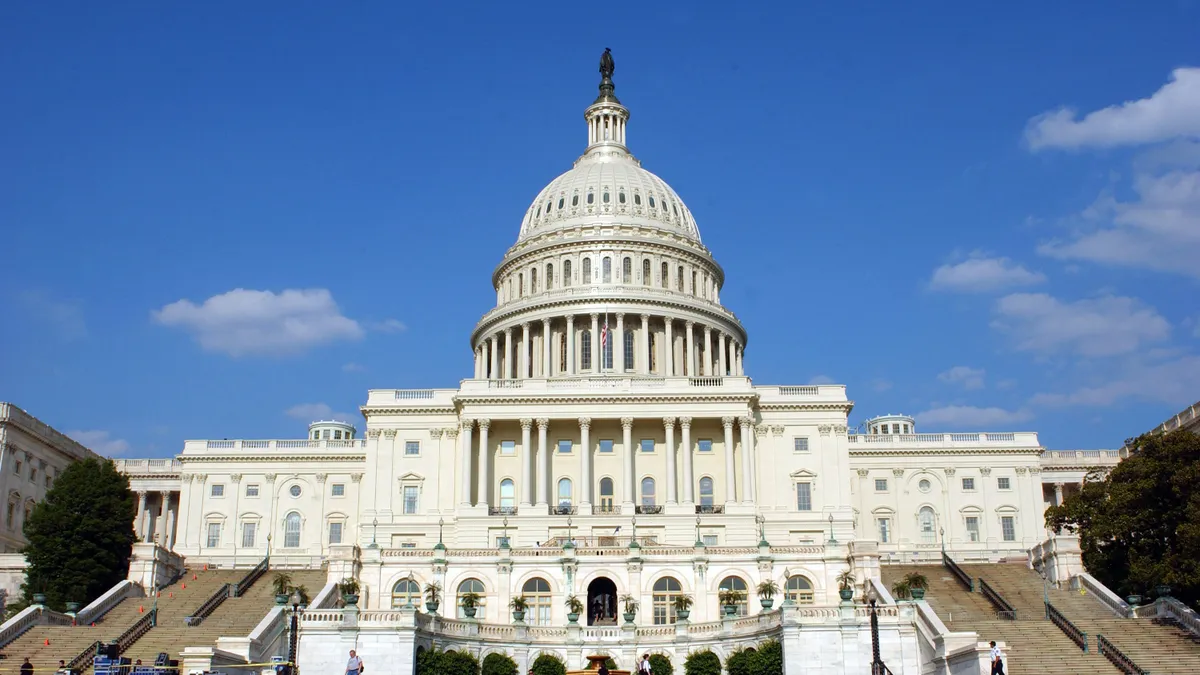Dive Brief:
- After weeks of negotiations, the Senate passed the $1.2 trillion Infrastructure Investment and Jobs Act Tuesday by a 69-30 margin, with 19 Republicans joining Democrats in favor of the legislation. Mike Rounds, a South Dakota Republican whose wife is undergoing cancer treatments, did not vote.
- The bill, which includes $550 billion in new infrastructure spending over the next five years, represents the largest new federal investment in the country's roads, bridges and highways in decades.
- The bill now awaits a vote from the House of Representatives, whose members do not return from recess until Sept. 20.
Dive Insight:
Measures in the legislation include $110 billion for improvements to roads and bridges and $66 billion for passenger and freight rail projects, in addition to expanding broadband access and electric vehicle capabilities across the country.
Groups like the American Society of Civil Engineers, which recently addressed the dire need for public works investment in its Infrastructure Report Card, lauded the Senate for passing the bill.
"With this legislation, the federal government will restore their critical partnership with cities and states to modernize our nation's infrastructure, including transit systems, drinking water pipes, school facilities, broadband, ports, airports and more," Jean-Louis Briaud, ASCE president, said in a statement shared with Construction Dive.
Mike Bellaman, CEO of Associated Builders and Contractors, noted the bipartisan nature of the bill, praising some of its provisions and criticizing others.
"Commonsense provisions in this bill will cut down on unnecessary delays in federal construction projects and help address the workforce shortage in the construction industry," Bellaman said in a statement shared with Construction Dive. "Importantly, the bill is paid for without raising job-killing taxes on our nation’s small construction businesses."
Earlier this year, Biden and congressional lawmakers had considered raising taxes to support new infrastructure funding and other programs, but the bill passed today will be paid for without raising the corporate tax rate.
Nevertheless, Bellaman said the inclusion of provisions favored by labor unions, including the expansion of prevailing wages, "Buy American" initiatives and local hire requirements could impact the bill’s success.
The road to the White House
Brian Turmail, vice president of public affairs and strategic initiatives for the Associated General Contractors of America, noted that the legislation will help generate jobs.
"The new infrastructure measure boosts federal investments in a wide range of infrastructure projects, which will help generate new demand for construction and create new, high-paying construction career opportunities," Turmail said in a statement shared with Construction Dive.
Senate Majority Leader Chuck Schumer, D-N.Y., made it clear before the vote Tuesday that the bipartisan bill is one of two major goals Democrats set for this summer. The other is a $3.5 trillion budget resolution to fund a broad range of social programs such as paid leave, child care, pre-K and green energy — something the Democrats believe they could achieve with zero Republican votes.
Following the infrastructure vote, the Senate will focus on the budget resolution, holding a "vote-a-rama" where an indefinite number of amendments will be considered. Once the measure passes, the Senate will begin its recess.
House Speaker Nancy Pelosi, D-Calif., has indicated the House will not take up the infrastructure bill until the Senate also presents its budget plan.
Turmail voiced concerns about tying these other measures to the infrastructure bill.
"Unfortunately, some members of the House want to delay action on the bipartisan measure until passing an unrelated, partisan spending bill. The last thing Washington should do is hold a much-needed, bipartisan infrastructure bill hostage to partisan politics," he said.














